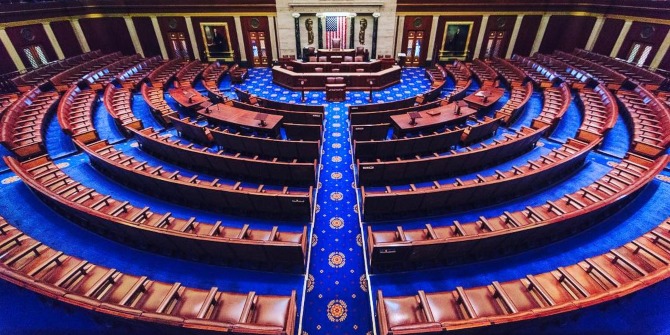Those ringing alarm bells about democracy in America could do no better than to examine Arizona in 2022, argues Eldrid Herrington. In the upcoming midterm elections, the Grand Canyon State has one of the tightest US senate races in the nation, meaning it may well determine which party will control the upper chamber of the US Congress. There are also important races in the US House of Representatives and at state level. Moreover, continual rehashes of the 2020 presidential elections and January 6th continue to echo through, and distort, the state’s politics.
- Looking ahead to elections across the US in 2022, our mini-series, ‘The 2022 midterms‘, explores aspects of elections at the presidential, Senate, House of Representative and state levels, and also reflects on what the results will mean for US politics moving forward. If you are interested in contributing, please contact Rob Ledger (ledger@em.uni-frankfurt.de) or Peter Finn (p.finn@kingston.ac.uk).
In Arizona the upcoming midterm elections follow the 2020 elections where the presidential and senatorial results were decided by two percentage points. Moreover, Arizona is intimately involved in some of the biggest national issues – including the events of January 6, 2021 and attempts to propound lies about the 2020 election results. Early voting in the primaries commences on 6 July 2022; primary day is 2 August.
The electorate and the candidates
The state electorate is split in thirds between Democrats, independents, and Republicans. Politicians running for office are also divided within their own party lines; for example, US Senator Kyrsten Sinema (D) faced the ire of fellow Democrats when she failed to support an abolition of the filibuster. On the Republican side there are a wide variety of Republican politicians with fealties – or otherwise – to Trump and kinds of Trumpism. Some candidates have shifted their positions about election integrity in the state or who have split loyalties, for example to Trump but not to Trumpist tactics. Amidst the variety, Arizonans have elected some of the most extreme right politicians in the country. The extreme nature of some politicians’ positions has led one veteran Arizona Republican politician to say that he was “concerned that if these people get elected’’ it will lead to ‘’another decade of craziness.”
Sinema is not up for re-election this cycle but rather the Democrat who captured John McCain’s seat after his death: Senator Mark Kelly, himself a veteran of the armed forces, a former astronaut, and husband to former US Representative Gabrielle Giffords, who was shot in the head by a constituent 11 years ago. Kelly has a substantial war chest of $23 million.
Republicans running for Senate
Tucson native Blake Masters is the current front runner for the Republican primary because of the backing of two prominent men. Trump has endorsed him as his chosen candidate for Senate, and tech entrepreneur Peter Thiel – who financed author JD Vance’s successful primary in Ohio – is bankrolling Masters’s candidacy, having donated nearly $14 million and rising. Masters was a member of Trump’s transition team and president of the Thiel Foundation as well as COO of Thiel Capital. Following Thiel’s lead, he is running on an anti-tech platform. In Arizona political circles he was notable for publicly predicting Martha McSally’s loss to Mark Kelly in 2020. He has claimed that the events of January 6th were a “false flag” operation, that Trump won the 2020 election, and also believes in the “great replacement theory”.
Those who have failed to curry Trump’s favor have a harder fight for the Republican nomination and have extreme tactics to match. Jim Lamon is a solar power executive who funded aspects of one of the so-called vote “reviews” in the state. One of his early campaign ads explicitly invoked the phrase “Let’s Go Brandon”, known to be a proxy for “F— Joe Biden”, a first for a national spot. On the 14th of December, 2020, together with 11 other Republicans, Lamon signed a letter falsely claiming to be one of Arizona’s official electors and sent it to the US Senate and the National Archives. He claims that this was a “backup plan”.
Attorney General Mark Brnovich’s name is known nationally for the Supreme Court case Brnovich v DNC, which watered down parts of the 1965 Voting Rights Act. He has gone from defending the 2020 Arizona election results – a stance that incurred Trump’s rage – to highlighting ‘’serious vulnerabilities’’ with how the election was run. It is not clear that this change of heart will persuade the Republican base that typically turns out for primaries.
Two other entrants are long shots. Major General Michael “Mick” McGuire helped to lead COVID-19 emergency response in the state and Justin Olson serves on the Arizona Corporation Commission, responsible for regulating utilities.
Not running is Governor Doug Ducey, who resisted Senator Mitch McConnell’s personal pleas for a centrist candidate who would appeal to independents in the state. Ducey perhaps knows it would be difficult to be successful in a Republican primary in the present climate and in the face of Trump’s continuing ire against him for refusing to overturn Joe Biden’s victory in Arizona in the 2020 presidential election.
Key US House and state races
Two of the notable architects of January 6th are the US Representatives from Arizona: Andy Biggs and Paul Gosar. Biggs reportedly asked for a preemptive pardon from the White House for his actions on January 6th. Meanwhile the dominance of Gosar in the west of the state can be seen in the fact he received 67.7 percent of the vote in 2020. There are though, signs of Republican impatience with his more extreme actions in respect of the 2020 election and to his ties to white supremacist movements, he has a number of more moderate candidates such as Adam Morgan running against him in the primary for the newly reconstituted 9th district. Also running a very long shot campaign in the second district is Ron Watkins, a man whom many think authors QAnon posts: messages from Q have suddenly restarted after a lengthy hiatus.
State races have also witnessed a race to the right, with hardline candidates such as Kari Lake running for Governor and Arizona state Representative Mark Finchem running for Secretary of State as a member of the America First slate. He was one of the people who falsely claimed to be an Arizona elector and was present at the Capitol building on January 6th 2021. Finchem represents a trend nationwide: Republican candidates whose goal appears to be to take over election administration for partisan gain.

“Blake Masters” (CC BY-SA 2.0) by Gage Skidmore
The past is prologue
The primaries and midterms in 2022 are, particularly for Republicans, all about the 2020 elections. This can be seen in new election laws passed in the Republican-dominated state legislature, ongoing election lawsuits, in Republicans’ vote “audits” in the state, and revelations about Republican politicians’ actions in the Capitol around 6 January 2021. However, the issue that predominates for the electorate at large is the economy: Senator Mark Kelly faces an even closer race because of rises to the cost of living and inflation. The financial situation means that issues such as the Supreme Court decision to strike down Roe v. Wade may pale in importance, even for white suburban women who surprisingly delivered a part of his victory in 2020.
Voting legislation and election lawsuits
Arizona voting laws are notable in the nation for having the only requirement to demonstrate citizenship. They are also some of the strictest: proof of address and identification also need to be provided. Voting drop boxes have been curtailed and larger numbers of voter purges from the rolls are taking place. Even ordinary administrative mistakes by election officials risk incurring criminal penalties.
90 percent of the electorate in Arizona votes by mail and votes early. Republicans have brought court cases attempting to disband these long traditions. They have been successful in getting the courts to agree that voters cannot fix missing signatures. A recent unsuccessful court case brought by the Republican Attorney General (Brnovich) against Democratic Secretary of State Katie Hobbs has attempted to make changes to the voter manual – another intrastate voting administrative technicality that will cost the electorate and a case some think attempts to destabilize confidence in voting.
Vote audits
The “audit” exercise in Maricopa County, initiated by Arizona State Senators in early 2021 to look for evidence of electoral fraud, bankrupted the new company running it, Cyber Ninja. Although the exercise cost the electorate $5 million, it has garnered the Republican party in the state close to $1 million in donations this election cycle; in 2019 at a comparable juncture its fundraising was closer to $100,000. Republicans in other states have taken note, particularly in Pennsylvania and Wisconsin, though there has so far been no copycat “audit”: politicians may be biding their time until after the midterms.
Attempts to question and reverse the vote have been resisted by many – chiefly Republican – administrative officials: the Maricopa County election board members and the Maricopa County Recorder and Supervisor. Such enormous public pressure has been chilling for democratic processes, as well as being time consuming and expensive.
January 6th
Arizona politics has been the subject of some of the most dramatic revelations and emotional testimony in recent months and it is not clear how the electorate will respond to recent news stories.
On 6 November, US House Representative Andy Biggs wrote to White House Chief of Staff Mark Meadows, that alternative electors should be submitted in “states where there’s been shenanigans”. Biggs was the first House Representative to stand up in Congress on 6 January 2021 and refute the election results.
On 9 November, Ginni Thomas, wife of Supreme Court Justice Clarence Thomas wrote an email to Arizona House Speaker Rusty Bowers and state representative Shawnna Bolick suggesting that a set of Republican politicians in Arizona replace themselves as electors over the official ones: “Article II of the United States Constitution gives you an awesome responsibility: to choose our state’s Electors…Please take action to ensure that a clean slate of Electors is chosen.”
On 21 December, Biggs and US Representative Paul Gosar phoned Rusty Bowers from the White House, asking him to set aside Arizonans’ votes. Bowers refused; in consequence, Republicans besieged his house and neighborhood at a time when his daughter was dying of a terminal illness. He said that they were “proclaiming me to be a pedophile and a pervert and a corrupt politician and blaring loudspeakers in my neighborhood and leaving literature on my property and arguing and threatening neighbors and myself.” Nonetheless, he said, he would vote for Trump again.
Given the continued attempts to question the 2020 result, the prominence of January 6th, and issues with election laws and voting requirements outlined above, the midterms in 2022 show that politics in Arizona may ultimately be divided less over political parties than it is over defending democracy itself.
Please read our comments policy before commenting.
Note: This article gives the views of the authors, and not the position of USAPP – American Politics and Policy, nor the London School of Economics.
Shortened URL for this post: https://bit.ly/3RbdwiY
About the author
Eldrid Herrington – University of Cambridge
Eldrid Herrington is a lecturer in English literature at Cambridge and a Senior Research Fellow in medicine at Queen Mary, University of London. She was recently a Visiting Fellow in history at Oxford.






